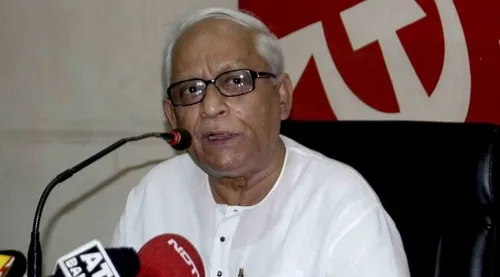CM Buddhadeb Bhattacharya
The return of the Boroli fish to the rivers of North Bengal has rekindled memories of former West Bengal Chief Minister Buddhadeb Bhattacharya. A symbol of the region’s ecological balance and a beloved delicacy, the Boroli fish’s reappearance is more than just an environmental success—it serves as a poignant reminder of the legacy of a leader who championed the cause of conservation and rural development.
Table of Contents
The Boroli Fish: A Symbol of North Bengal’s Rivers
The Boroli fish, also known as Boroli Mahseer, holds a special place in the cultural and ecological tapestry of North Bengal. This freshwater fish, once abundant in the region’s rivers, had been gradually disappearing due to pollution, habitat destruction, and overfishing. The dwindling numbers of Boroli fish became emblematic of the broader environmental degradation facing North Bengal’s river ecosystems.
The fish is revered not only for its taste but also for its importance to the local economy. For generations, the Boroli fish has been a staple in the diet of the people living along the rivers of North Bengal. Its decline over the past few decades had not only threatened the ecological balance of the region but also the livelihoods of the many fishermen who depended on these waters.
The Role of Buddhadeb Bhattacharya
Buddhadeb Bhattacharya, who served as the Chief Minister of West Bengal from 2000 to 2011, is remembered for his dedication to the state’s development, particularly in rural and environmentally sensitive areas like North Bengal. An advocate of sustainable development, Bhattacharya understood the intricate connection between the environment and the well-being of local communities.
During his tenure, Bhattacharya initiated several projects aimed at revitalizing the region’s rivers and restoring the ecological balance. He emphasized the importance of protecting North Bengal’s rich biodiversity, which included species like the Boroli fish. His government’s policies sought to combat the pollution and illegal fishing practices that were contributing to the decline of the Boroli population.
Under his leadership, there were efforts to strengthen the enforcement of fishing regulations and promote sustainable fishing practices. Additionally, Bhattacharya’s administration supported reforestation programs and the creation of buffer zones along rivers to protect aquatic habitats. Though these initiatives faced challenges and were not always fully successful, they laid the groundwork for the gradual recovery of species like the Boroli fish.
The Return of the Boroli Fish
The recent sighting of Boroli fish in North Bengal’s rivers has been hailed as a positive sign of ecological recovery. Environmentalists and local communities alike have celebrated the return of this species, viewing it as a testament to the resilience of nature and the effectiveness of conservation efforts.
The return of the Boroli fish is also seen as a result of continued efforts by environmental organizations and the government to improve the health of North Bengal’s rivers. In recent years, there has been a renewed focus on reducing pollution, curbing illegal fishing, and restoring natural habitats. The reappearance of the Boroli fish suggests that these efforts are beginning to bear fruit.
For the fishermen of North Bengal, the return of the Boroli fish brings both economic opportunities and a sense of cultural continuity. The fish, once again swimming in their nets, revived a traditional livelihood that had been under threat for many years. It also restores a vital source of nutrition for local communities, many of whom have struggled with food security in the face of declining fish populations.
Memories of a Leader
The return of the Boroli fish has inevitably stirred memories of Buddhadeb Bhattacharya, whose leadership was marked by a deep concern for the environment and rural development. Though his time in office was not without controversy, many in North Bengal remember him as a leader who genuinely cared for the region and its people.
Bhattacharya’s commitment to sustainable development and environmental protection left a lasting impact on West Bengal’s policies. His efforts to revive the Boroli fish population, though not fully realized during his tenure, are now seen as a precursor to the current resurgence. For many, the fish’s return is a fitting tribute to a leader who sought to balance development with ecological preservation.
Conclusion
The return of the Boroli fish to the rivers of North Bengal is more than just an environmental success story—it is a symbol of hope, resilience, and the enduring legacy of a leader who understood the importance of protecting the region’s natural resources. As the Boroli fish swims once again in the waters of North Bengal, it carries with it the memories of Buddhadeb Bhattacharya and his vision for a sustainable and prosperous future for all.








